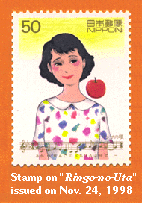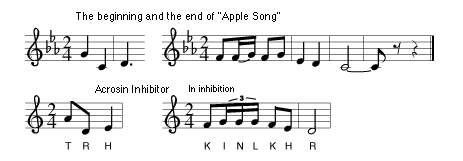 Kissing a red apple, I looked at ... Kissing a red apple, I looked at ...
There should be no Japanese who does not remember the melody corresponding
to these words. At the same time, every Japanese probably knows when this
song made a great success.
About this "Ringo-no-uta or Apple song", Dr. Joel Sternheimer,
a French physicist, says that including the beginning, this song contains
several passages identical to parts of a melody which is able to inhibit
the function of a protein called acrosin inhibitor. He says so because he
has discovered rules that translate proteins into melodies.
The resulting melodies are able to affect the synthesis of these proteins.
This fact would explain how music can affect living creatures deep inside.
Proteins are composed of 20 kinds of amino acids connected in series like
a necklace of pearls. About the relation between proteins and music, Dr.
Sternheimer explains: "To each amino acid, a musical note is associated.
But not anyhow: of two such ways or rules for associating a musical note
with an amino acid, one is able to stimulate and the other to inhibit the
synthesis of the corresponding protein. Such stimulation or inhibition takes
place through a physical resonance phenomenon similar to sympathetic strings
in a musical instrument".

The "Apple song" brought the Japanese courage and desire
to ...
With this in mind, let's now talk about the relation between the "Apple
song" and acrosin inhibitor. The latter is a protein in seminal plasma
and, as can be guessed from the name, inhibits acrosin which is at the head
of sperm and has the key function to achieve fertilization, by dissolving
the transparent membrane encircling an ovum. Therefore, by inhibiting the
function of acrosin inhibitor, fertilization or conception is promoted.
 About the "Apple song" there are several interesting episodes.
This song was sung in "Soyokaze or Breeze", the first new
Japanese film after the War. Although the film was planned during the War,
the end of the War came before it was realized. Just after the War, the
plan was inspected by the General Headquarter. In less than two months after
the permission, the film was made and released on the 11th October. After
a while, the song became very popular independent of the film and finally
recorded in the next year. The record is said to have been sold 125 thousand
copies before the end of the year. About the "Apple song" there are several interesting episodes.
This song was sung in "Soyokaze or Breeze", the first new
Japanese film after the War. Although the film was planned during the War,
the end of the War came before it was realized. Just after the War, the
plan was inspected by the General Headquarter. In less than two months after
the permission, the film was made and released on the 11th October. After
a while, the song became very popular independent of the film and finally
recorded in the next year. The record is said to have been sold 125 thousand
copies before the end of the year.
The words of the "Apple song" were already prepared during the
War by a poet, Sato Hachiro, who thought that a cheerful song is needed
in such a depressing war period, but were left without music. Even when
the scene for the "Apple song" was filmed, the melody was not
completed and therefore introduced in the film by postsynchronization. In
this way, the melody of the "Apple song" was created with difficulty
when time pressed.
It is a common phenomenon that a baby boom comes after a war. The "Apple
song", which contains melodies promoting conception, appeared in Japan
in such a period. The composer, Mr. Manjome Tadashi, may have sensed such
collective unconsciousness of the Japanese people just after the War and
represented it as a melody for us.
It is natural that a cheerful song has a great hit soon after a war. But
there are a lot of cheerful songs. Among such songs, only the "Apple
song" continued to be sung by the Japanese people during the Baby boom.
The protein music is a key to the fate of mankind
A protein is synthesized according to the information contained in genes
which have a long history of several thousand million years; then a specific
melody related to the protein is produced by a composer at a specific time
and place; and the melody makes a great success.
"The Apple song including passages of acrosin inhibitor could have
met the needs of the Japanese people to make children just after the war.
They felt therefore the song very comfortable and were strongly attracted
to it." This is the analysis of Dr. Sternheimer.
Mr. Manjome is said to have declared as follows: "This song will certainly
have a great success. But only for five years." It is regrettable that
we can no more ask him the reason of the declaration. |
 Kissing a red apple, I looked at ...
Kissing a red apple, I looked at ...
 About the "Apple song" there are several interesting episodes.
This song was sung in "Soyokaze or Breeze", the first new
Japanese film after the War. Although the film was planned during the War,
the end of the War came before it was realized. Just after the War, the
plan was inspected by the General Headquarter. In less than two months after
the permission, the film was made and released on the 11th October. After
a while, the song became very popular independent of the film and finally
recorded in the next year. The record is said to have been sold 125 thousand
copies before the end of the year.
About the "Apple song" there are several interesting episodes.
This song was sung in "Soyokaze or Breeze", the first new
Japanese film after the War. Although the film was planned during the War,
the end of the War came before it was realized. Just after the War, the
plan was inspected by the General Headquarter. In less than two months after
the permission, the film was made and released on the 11th October. After
a while, the song became very popular independent of the film and finally
recorded in the next year. The record is said to have been sold 125 thousand
copies before the end of the year.